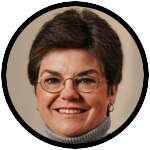
Effie Caldarola
On the Great Plains, we had a gorgeous fall.
Then, on Oct. 28, my journal read: “Winter moved in during the night. It had been pushing on us with strong, gusty winds all week, but last night it arrived with a hard, killing frost and this morning, triumphant cold.”
It is wonderful to live in a place with seasons, because often they correspond with the seasons of the heart. The killing frost that put an end to my roses and mums quieted something inside of me, too.
The novelist Willa Cather wrote about Nebraska’s prairie and its immigrants.
In “O Pioneers!” she said about winter: “Winter has settled down … again; the season in which Nature recuperates, in which she sinks to sleep between the fruitfulness of autumn and the passion of spring.”
History and Scripture don’t give us a clear idea of when Jesus was born, but tradition places our celebration of his coming in the darkest days of winter, and for good reason.
[hotblock]
“The people who walked in darkness have seen a great light,” the prophet Isaiah said, and Christmas impresses on us that his words were not just metaphorical, speaking to our spiritual darkness, but ultimately physical. In the midst of night and darkest winter, we yearn for light.
Cather would have been familiar with the rural area where I grew up, where night brought star-studded blackness. Her novel, “My Antonia,” was about a Bohemian immigrant family. My nearby hometown saw a wave of Bohemians arrive in the earliest 20th century.
When I was a little girl, you could hear aged women wearing babushka scarves chatting in their native tongue on the downtown streets. They seemed welcome there.
Today, America seems to be in a time of darkness. Immigrants still arrive, but Congress fails to provide any path to citizenship or any immigration reform, and there is a strange meanness that haunts our streets and our dialogue.
I have friends who came as Syrian refugees a year and a half ago, but a brother whom they expected to follow remains stuck in Turkey because now it is so much harder to obtain refugee status even after intensive screening.
[tower]
My friend Ruth has been visiting a Somali man imprisoned for well over a year in a local jail. He fled persecution by the terrorist group al-Shabab in Somalia, and was granted asylum by a judge here. But repeated appeals by the government keep him confined for no discernible reason.
He is at the mercy of jail guards — some kind, some vindictive.
These stories reflect a nationwide reality.
At their recent meeting, the U.S. Catholic bishops again urged immigration reform. Archbishop Thomas G. Wenski of Miami said, “We can make America great, but you don’t make America great by making America mean.”
President Ronald Reagan spoke hopefully of morning in America, but right now it feels like a winter night.
Advent falls into this time of darkness, and that’s not necessarily a bad thing. Darkness encourages introspection and reflection.
If, as Cather said, winter is Nature’s time of recuperation, perhaps we, too, can allow this holy season of waiting for our Savior to encourage healing. We might examine the anger in our own hearts, anger that divides us as a nation and sometimes as a church.
A Midwestern farm landscape in winter can be bleak, a palette in black and white, yet it strips things to their essence.
December often brings frenetic activity, overconsumption, wastefulness. Maybe this year, Advent and our winter can slow us down and help us reflect as we wait for the light.
PREVIOUS: A plea for our fellow Catholics
NEXT: Babysitting grandmom overcommits to her daughters; now what?



There’s a spot in the Evangelical churches for this kind of response, consider that. I’m not getting the sense that a good Christian should hide behind secular legal arguments. What you do for the least of your brothers…
Let’s all pray more on this, but we can do better than we are doing in America right now.
Illegal immigrants have a path to citizenship. It’s called entering the country legally, and I don’t think that it has anything to do with being mean. The influx of millions of illegals flooding our country is a major problem don’t you think?